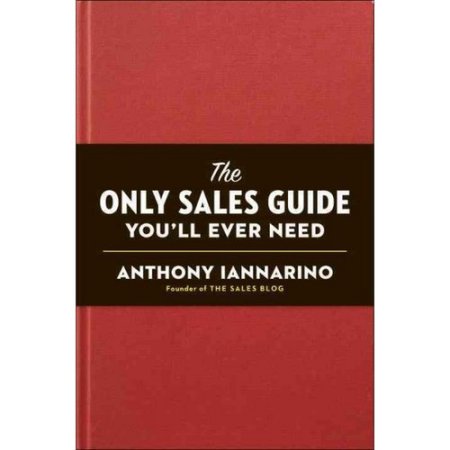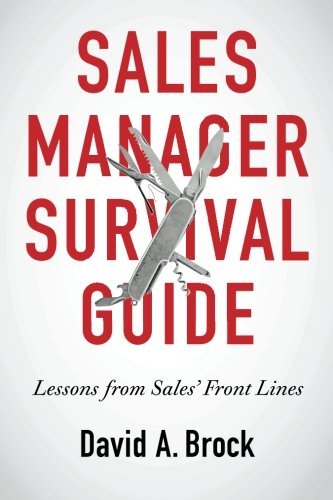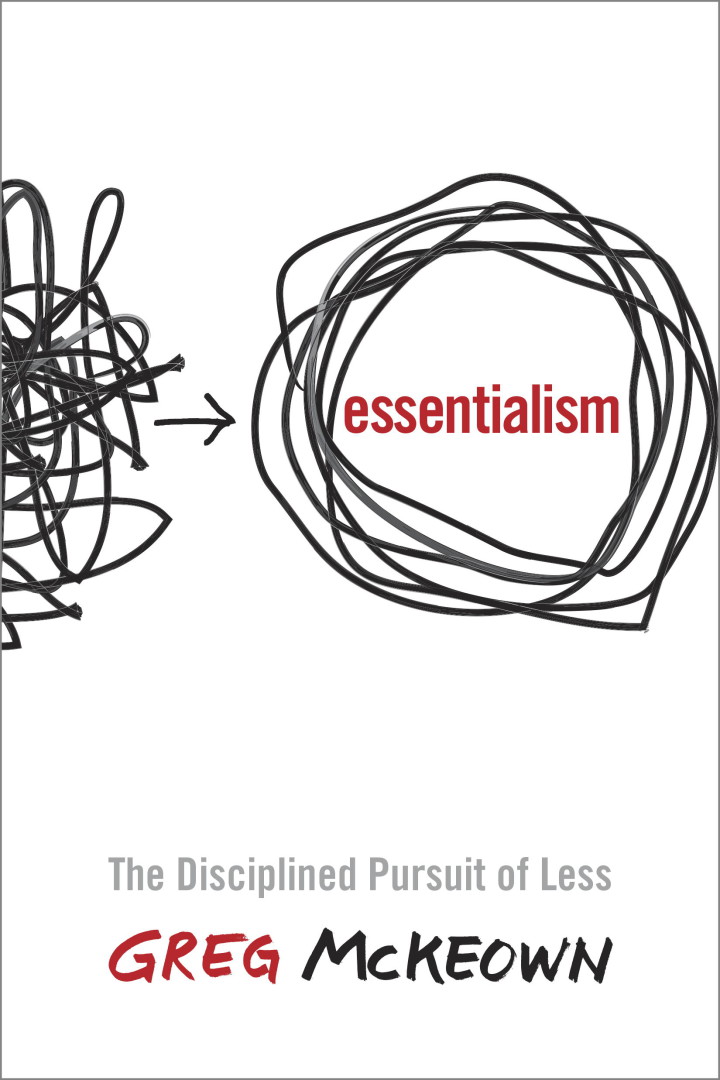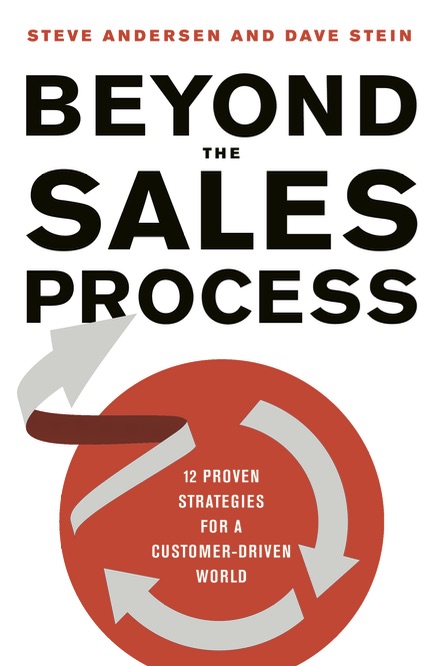Anthony Iannarino’s career has combined the best traits of a salesperson, teacher and writer, so it’s no wonder that his first book, The Only Sales Guide You’ll Ever Need, can be read by all for both pleasure and profit.
I say “all” because the advice contained in this book can help you whether you are just starting in sales or have more years of sales experience than you care to count. Beginners can benefit by adopting the right mindsets early and by honing their skills over time, while old dogs like myself get a much-needed reminder and kick in the pants to get back to things we thought we knew.
The first half of the book focuses on mind-set, or the beliefs and behaviors that characterize successful salespeople. Anthony addresses ten of these mind-sets, including self-discipline, caring, persistence and accountability. One might argue whether some of the mind-sets, such as optimism and caring, are inborn traits that are very difficult to change, but even there Anthony goes beyond telling you they’re important—he provides checklists and advice for developing them if you’re falling short.
The second half of the book is all about skill sets, and these are definitely areas where even those of us with a lot of experience can find room for improvement. From closing to prospecting (yes, you read that right: for Anthony, closing comes before prospecting—but you will have to get his book to find out why), to negotiating and business acumen, the skills you need to succeed at complex B2B sales are here. As you read each chapter, it’s clear that Anthony’s ideas are based on real—and most likely painful—experience. For example, he cautions against the commonly dispensed advice to call as high in the organization as possible. He reminds us that “You may be presenting to the C suite, but I promise that you will be executing further down the organizational chart, where the ground truth lives.”
I love that phrase: the ground truth. That’s exactly what Anthony tells the reader in every page.
As an author of three sales books[1] myself, I could easily quibble with the title of Anthony’s book, because there are a few areas about sales that Anthony does not write about in his book. But then I’m reminded of what happened to Winston Churchill. As a boy he was held back from the smarter boys in his class and made to focus exclusively on English—and we know how that turned out. He wrote:
“Naturally I am biased in favour of boys learning English. I would make them all learn English: and then I would let the clever ones learn Latin as an honour, and Greek as a treat. But the only thing I would whip them for is not knowing English. I would whip them hard for that.”
This book is like learning English. It’s packed with exactly the right lessons that you need to succeed in sales. In that sense it is the only guide you would ever need. If one of my kids were going into sales—this is the first book I would have them read. They could always read mine later—as a treat!
[1] Full disclosure: Anthony proved me an advance copy and also includes my book Bottom-Line Selling in his recommended reading list at the end of Chapter 16.
Imagine that you’ve just been named a first-line sales manager. You’re proud, you’re excited, and you’re about to be overwhelmed by the demands of the job. It is one of the toughest jobs in business. You’re going to quickly find out that what got you there won’t keep you there; the skills that got you promoted as an individual contributor don’t translate directly to getting work done through others. To top it off, your company spends a minuscule amount of its sales training budget on sales management skills.
Sounds like a sure-fire recipe for failure, but fortunately you have a wise mentor—let’s call him Dave—who has decades of experience in the sales trenches, and even more importantly knows how to impart that wisdom to others. This mentor helps you get oriented to the job and gives you excellent guidance about how to navigate and survive the crucial first 90 days. Building off that, he schedules regular sessions with you to focus on critical building blocks of sales management success, such as coaching, hiring, managing performance, and practically everything else you need to know to not only survive but thrive.
Your sessions with him are succinct, direct and powerful; he doesn’t waste your time with vague management theories; and he’s always completely candid with you. With that kind of coaching and mentorship, as long as you heed the advice and do the work, it would be almost impossible not to succeed as a front line sales manager!
Sounds too good to be true, doesn’t it? Actually it’s mostly true. He does exist, his name is Dave Brock, and the only thing wrong with the scenario I just mentioned is that you probably can’t afford for him to spend time with you personally each week. But you can buy his book, Sales Manager Survival Guide, and get the same benefits. If you are a first time sales manager, this book will launch you in the right direction, and if you’ve been in the role for a while, it may help you make whatever mid-course corrections you need to assure success.
All that said, I have to be completely candid. I’m a bit biased, having known Dave for over 25 years, first as a client, next as a sales training partner (which is why I know he knows how to impart his wisdom), and as a fellow blogger and sales expert. So maybe you’ll just have to trust me on this: Sales Manager Survival Guide will be one of the best and most indispensable investments you could make as a sales manager. the only reason not to have a copy is if you have a healthy consulting budget and already have Dave on speed-dial.
Since I’ve begun writing about and training others in lean communication, I tend to see more and more around me through a lean lens, which is why Essentialism by Greg McKeown is a book that has gripped my attention so tightly. McKeown does not mention lean in his book, but it’s exactly the same philosophy: figure out what’s important and then cut out everything that does not directly contribute to that. That’s why Essentialism is not like most how-to books that tell you how to get more things done; it’s about how to get more important things done better.
One of its key tenets is the application of the design philosophy of Dieter Rams: less but better. It’s an apt term because pursuing essentialism is about living by design, not default. That word design is key, because, according to Mihaly Csikszentmihalyi, author of Finding Flow, everything we do in life we do for one of three reasons: we want to, we have to, or we have nothing better to do—and we spend about a third of our time in each. To put it in design terms, we design the first third, someone else designs the second for us, and the rest is simply default.
That last third is completely under our control, but it takes vigilance and discipline. The second third is also much more under our control than we might think, although it takes courage to tell others no. But we don’t have to go to every meeting, reply to every email, or agree to every task that’s handed to us. By saying no, you may disappoint others initially, but they will respect you more, and you will have more room to focus on what’s essential to yourself or your higher purpose.
It matters for two reasons. First, people feel best when they are doing the things they want to do, which is no surprise. What is surprising is that doing things because you have to, actually makes you feel better than doing things because you have nothing better to do. So, taking control of your actions will make you better off right now. Second, if you are disciplined in choosing important work that contributes to your own or others’ well-being, you—and they—will be better off in the future as well.
The best test of any book is not what you learn, but what you do differently as a result. You many not learn any deep secrets that you don’t already know in some form or another from reading Essentialism, but McKeown has a way of making you look at familiar ideas in a completely fresh way that stops you in your tracks and makes you think. I’m sure everyone who reads it will connect with something different, but for me it was a simple but powerful question: “What’s Important Now?”
For me, just asking that question every time I find myself drifting into the “nothing better to do” mode, or decide whether to agree to someone’s request, goes a long way to changing the proportions of activity—and the results that come from that.
So if you want to take lean thinking beyond lean communication and apply it to your life, it’s essential that you read this book.
Beyond the Sales Process, by Dave Stein and Steve Andersen, is my kind of book, because it takes a big picture view of B2B sales. Here’s the gist: many B2B sellers get in too late and leave too soon. If you engage with potential customers only during their active buying efforts, you’re like the drunk looking for his lost keys under the streetlight—just because the light’s better there.
Stein and Andersen make the point that even with complex B2B sales, buyers might actively buy from you only about 2% of their total time in a year. Most sales books focus their prescriptions, during that narrow 2% window called the sales process, when the buyer is actively seeking to fill an identified need. The problem with that is that while there is a need, there is also a lot of competition and very little trust.
If you want to achieve the status of trusted advisor, you have to pay attention before, during and after the sales process. They delineate 12 strategies, distributed equally across the entire life cycle, what they call Engage, Win and Grow.
Engage
This is the pre-opportunity phase in which you do in-depth research to understand your customer’s business and use the insights gained to earn the right to engage with your customers in elevated discussions about what they need to do to achieve their business objectives, how you will help them do it, and why it’s important. I’m vastly oversimplifying here, of course, but the general idea is to put yourself in a position where you can credibly be seen as a potential trusted advisor by the right people in the customer’s organization before a specific opportunity comes up. By doing so, you will be in a position to influence and shape their needs and hence their requirements.
Win
This phase is the main focus of approaches that focus on the meat of the sales process: the pursuit of opportunities from identification through the sales funnel to closing. The four chapters in this section will be familiar to anyone who has experience and training in common sales methodologies: they cover the fundamentals of discovering the key drivers that relate to the specific sales opportunity, and how to use those to deliver “actionable awareness,” which is a key point that I personally believe many B2B salespeople miss. They know the importance of learning about their customer’s business, but most of them use their research to gain data points that they can use to sprinkle in their product pitches to give them a veneer of “customer focus” and business sophistication. Scratch beneath surface, though, and you find they don’t truly bring key insights that show how they can uniquely impact the customer’s business.
Grow
There are very few feelings as exhilarating as winning that big deal of the year, but you have to resist the temptation to take your eye off the ball at this point. If you keep your attention in the post-sale phase to realizing the value that was promised during the win phase and validate its impact on the customer, adapt to changes and issues as they arise, and expand the relationship, you will have a firm launching pad for all future opportunities that arise.
If you’re a sales professional who has already read many of the excellent books that guide you through the sales process, Beyond the Sales Process is an excellent complement that will illuminate the rest of the sales landscape and expand your view of what it takes to raise your game.






